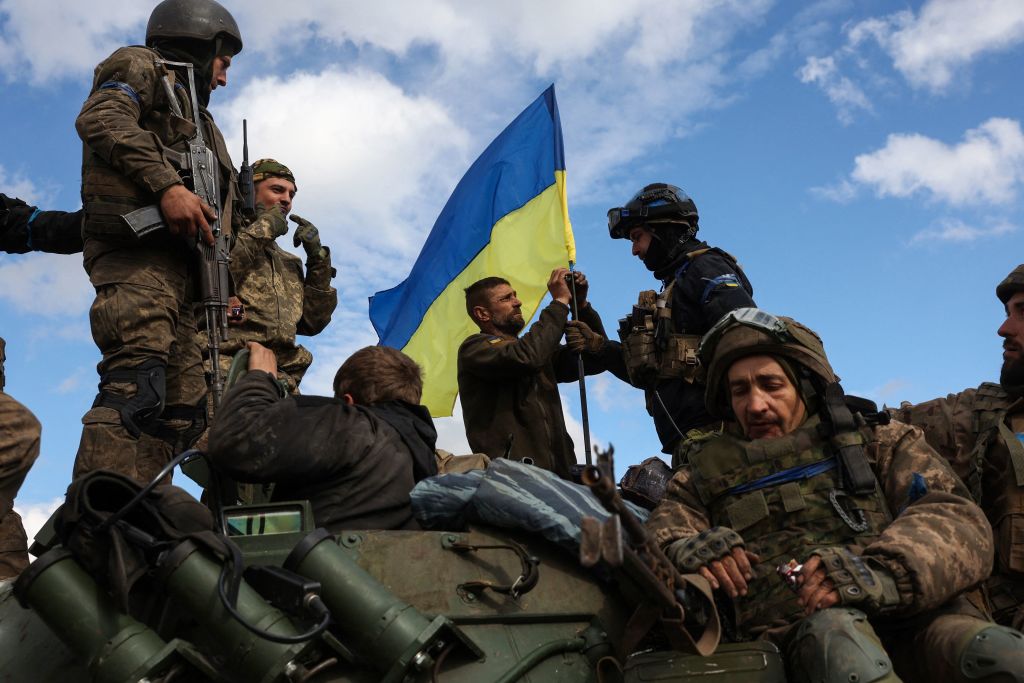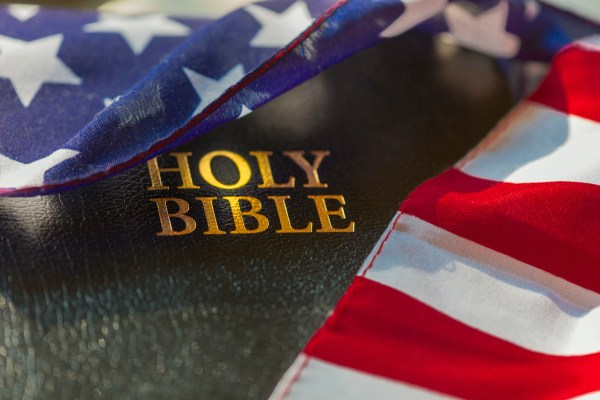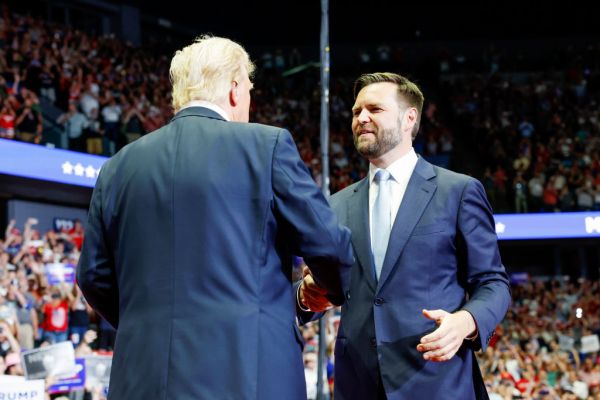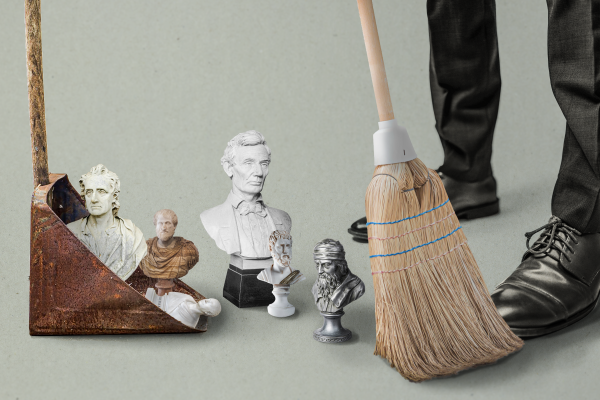Is Ukraine’s war of self-defense against Russia an example of good nationalism? David Brooks, Paul Pillar, Michael Barone and many others think so. They herald the warm moral glow of Ukraine’s heroic stand as a beacon of a new, friendly kind of nationalism, rooted in love for one’s country and a willingness to defend it—entirely separate from the bad, dangerous, ethno-chauvinist kind of nationalism.
If this be nationalism, count me in, and let us make the most of it. But let me note, just as a matter of history, most people have called this patriotism. Take George Orwell: “By ‘patriotism’ I mean devotion to a particular place and a particular way of life, which one believes to be the best in the world but has no wish to force on other people.” Relevant to the Ukrainian war of self-defense, Orwell wrote that, “patriotism is of its nature defensive, both militarily and culturally.”
Many people today use the terms nationalism and patriotism interchangeably, especially whenever the word nation is present. Because the Ukrainians are defending their nation, it must be nationalism. Many people are keen to defend national sovereignty (against the supposed encroachments of globalists or multinational corporations), and thus endorse nationalism.
Orwell specifically warned against equating patriotism and nationalism, and with good reason. He demanded exact definitions and precise usage. And he knew that the word nationalism had a history resonant with meaning. We cannot unilaterally wish that definition away by using it to mean something different from what it has meant for decades.
Patriotism is the love of country; nationalism is an argument about how to define one’s country. Nationalism and patriotism aren’t opposites and they can overlap, but they also diverge.
Patriotism says, “I love my country”; nationalism says, “My nation has this kind of culture, not that kind.” Patriotism says, “This place is familiar; I am grateful for it; I will defend it.” Nationalism says, “If my country strays too far from what I think it should be, it won’t really be my country anymore.” Patriotism says, “I love my fellow countrymen.” Nationalism says, “Only people who share my culture are really my fellow countrymen.”
Ukrainians are defending their nation, their national independence, and national sovereignty. That makes them patriots, but does not necessarily make them nationalists, at least not in the traditional sense of the word. They don’t have to agree on what kind of country they are to defend it from invasion. They don’t have to have a single shared national culture to love it and want to stop an aggressive invading power from conquering it. They only have to recognize that they share a story and a common political destiny, one that Russia is trying to take away.
The Ukrainian resistance is an especially bad poster child for the kind of nationalism that wants to build a single national culture. Ukrainian President Volodymyr Zelensky is a Russian-speaking Jew in a country where two-thirds of the population speaks Ukrainian and some 98 percent profess some version of Christianity. Ukraine’s war of self-defense is, in fact, an excellent example of patriotic pluralism.
Vladimir Putin, on the other hand, made a classically nationalist argument in his speech outlining his rationale for war. Putin claimed that Ukraine was a creation of Russia and that there was no such thing as an independent Ukrainian national identity apart from the Russian Federation. He and other Russian propagandists have claimed a moral imperative to reunify Russia with ethnic Russians in eastern Ukraine and, more broadly, with Russia’s cultural roots in “Kievan Rus.”
Russia is this kind of nation, Putin argued, a nation for people of the Russian language and people of the Russian Orthodox Church (which traces its origins to Kyiv). Russia’s boundaries must expand to encompass all those people and all the realm in which Russia’s Orthodox culture is rooted. For Russia to fulfill its nationalist identity, it had to conquer Ukraine.
America’s national conservatism movement—some of which has been oddly kind to Putin—is a nationalist movement in the traditional sense. America is a specific kind of nation, a Judeo-Christian nation—not in a theocratic way, but culturally. “The Bible should be read as the first among the sources of a shared Western civilization in schools and universities, and as the rightful inheritance of believers and non-believers alike,” according to the national conservatism conference website, “Where a Christian majority exists, public life should be rooted in Christianity and its moral vision, which should be honored by the state and other institutions both public and private.”
American nationalists have invoked the Ukrainian example as proof that nations should be allowed to defend themselves. If Ukrainians can defend their nation against the barbarity of Russia’s blatant aggression, they say, we too should be able to defend our nation against globalism, open borders, and multiculturalism.
Making American institutions and American public life honor Christianity may or may not be wise (spoiler: it’s not), but it is not the same thing as Ukrainians valiantly defending their home from military conquest. Ukrainians fighting for their physical survival are not models for Americans fighting to get their religion honored by the state. It is an abuse of words to call both things nationalism. American nationalists who invoke the Ukrainian resistance as a poster child for their agenda are being disingenuous, borrowing the moral authority and elan of Zelensky’s Churchillian moment for a wholly distinct agenda.
They can claim a similarity only if they believe that America’s very existence is at stake; if America will cease to be if they lose or if America changes too much. If that were true, their fight to preserve a traditional notion of American identity really is the moral equivalent to Ukraine’s war of self-defense. But to believe that is also to assert that non-nationalist Americans are the moral equivalent of an invading army, which explains a lot about the deep polarization of our moment. It seems at odds with shared democratic citizenship, and it is the sort of logic that leads a mob to storm the Capitol in the name of saving democracy.
It is good to love America and to defend it. Defending America means defending its ideals, its Constitution, as well as its borders—but does not mean defending a single national culture for all Americans. To believe that America’s existence is at stake with the rise or fall of a specific culture is also to believe that our country will no longer be our country if it changes too much—which seems a strikingly ungrateful and even, dare I say, unpatriotic thing to believe.








Please note that we at The Dispatch hold ourselves, our work, and our commenters to a higher standard than other places on the internet. We welcome comments that foster genuine debate or discussion—including comments critical of us or our work—but responses that include ad hominem attacks on fellow Dispatch members or are intended to stoke fear and anger may be moderated.